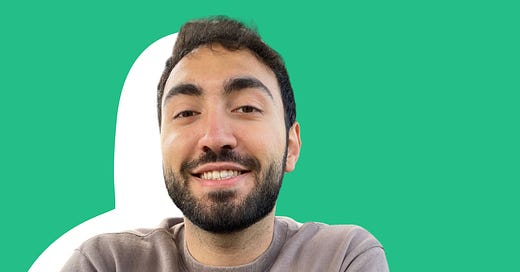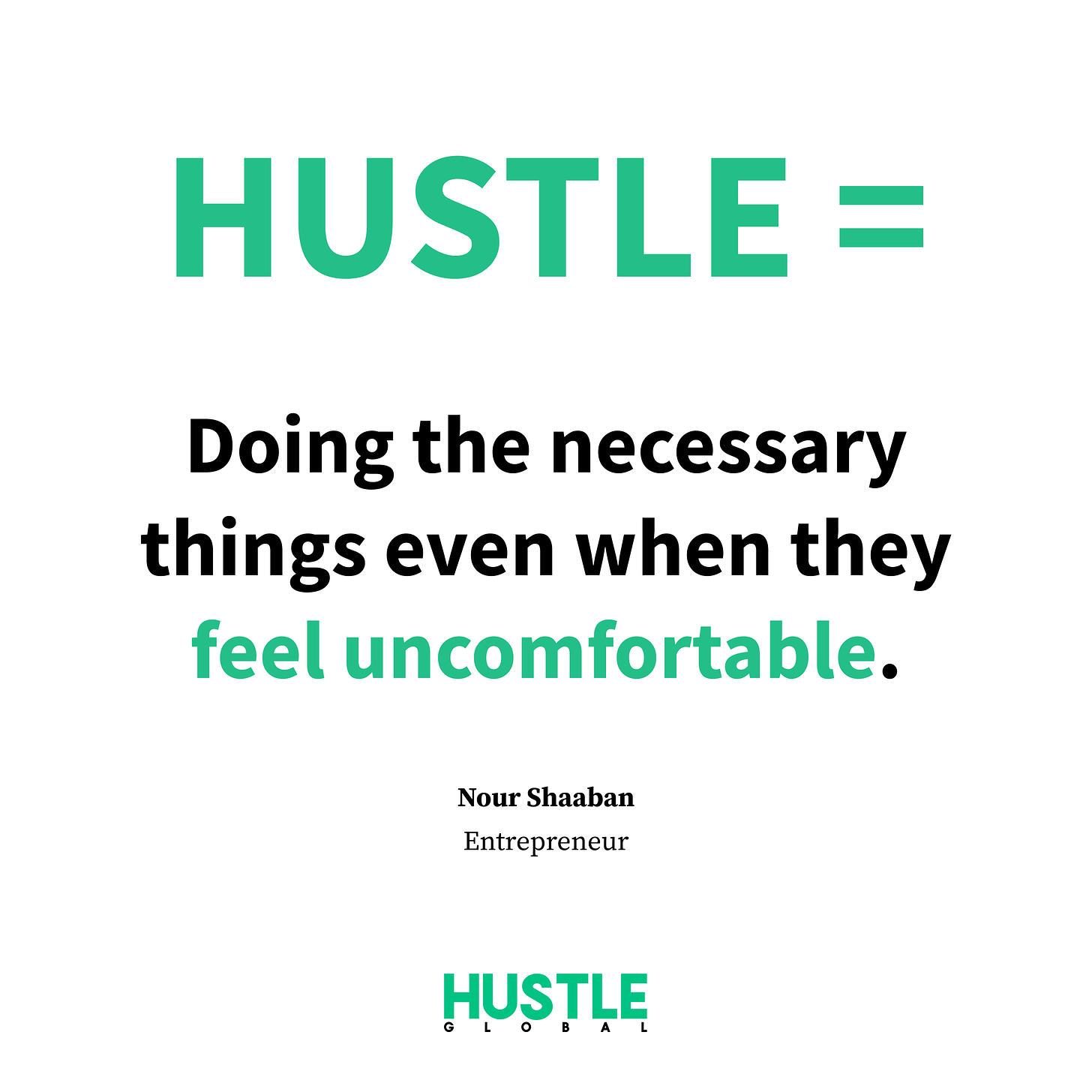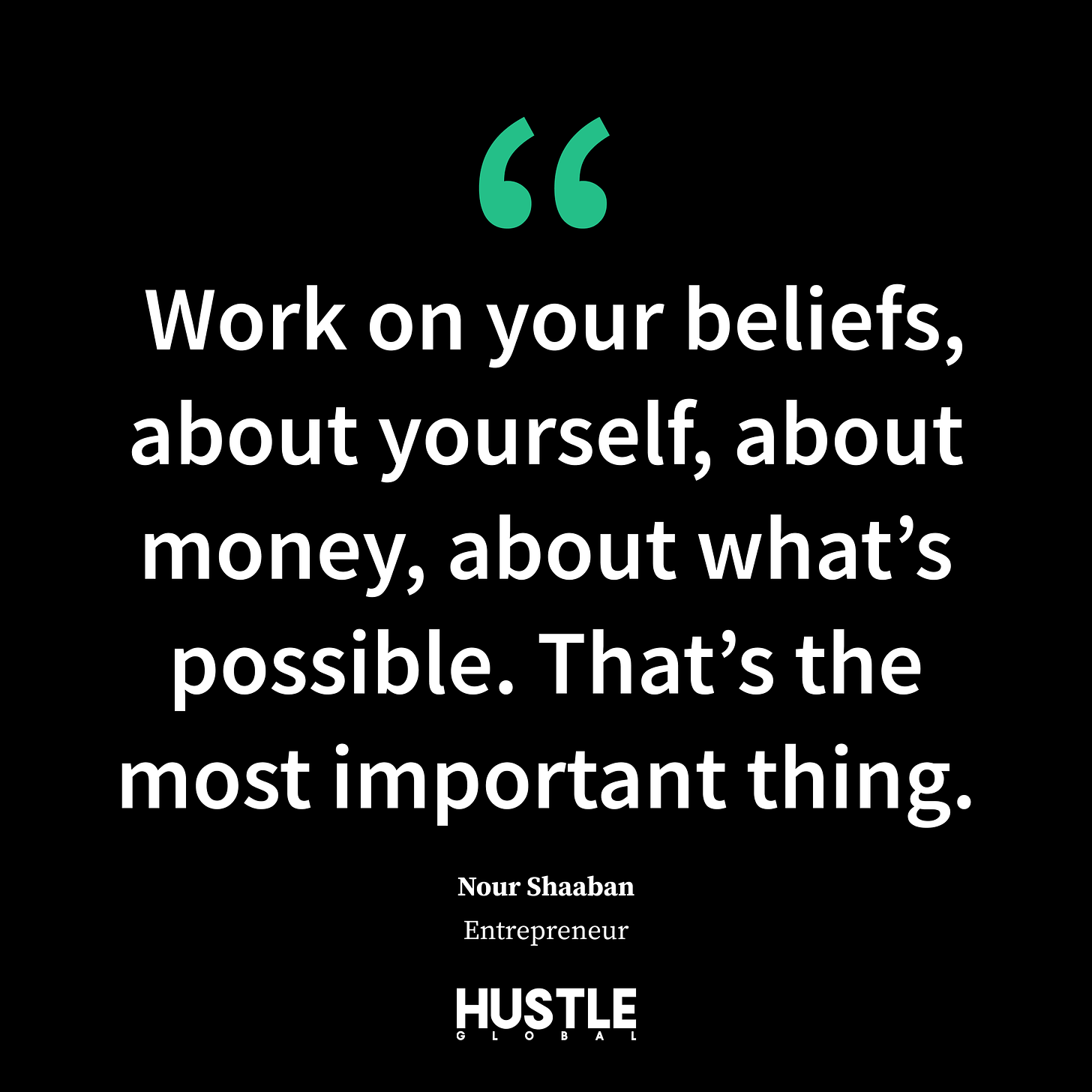From $3 million in revenue to a 7-figure exit: notes on building and selling online businesses with Nour Shaaban
Learn expert tips about business building, creating an exit strategy, and overcoming failures.
Hey. 👋 Alexis here from Hustle Global. I share inspiring stories about entrepreneurs, DIY marketing tips, notes on my personal experience as a solopreneur, and more. If you’re new here, join the list to hear from me 1x per week (no more, no spam).
Serial entrepreneur Nour Shaaban has founded multiple businesses and most recently achieved a seven-figure exit from his latest venture, Love Addicts — an online platform that provides therapy for people with anxious attachment styles.
I had the opportunity to pick his brain about the lessons he learned, how and when to develop an exit strategy, his top tips for entrepreneurs, and more.
Ready to be inspired? Let’s dive in. ⤵️
Hustle Global (HG): Can you walk us through the inception and development of Love Addicts? What were some of the key lessons you learned from that experience?
Nour Shaaban (NS): I’ve been an entrepreneur for the past 7-8 years, and I did affiliate marketing, ecommerce, and influencer advertising. So I had a lot of the direct marketing skill set.
I was in this relationship that really triggered my anxious attachment, which is a childhood coping mechanism that makes you feel anxious, jealous, worried, and afraid your partner is going to abandon you.
And I also was studying psychology at the time, so I knew how to solve this problem for myself.
And one day in the shower, it clicked. I realized I could combine all three skills to create something that could help people, as there were millions of people worldwide who were struggling with this.
So I put together some key lessons:
Move fast and break things, don’t worry about creating a perfect product. Be okay with a subpar product for the start, as the momentum will lead to a good product later.
Build a business in a market you really understand, more than the audience understands themselves. You need to know all their thoughts and what keeps them up at night.
Start with a team as that will help you stay accountable and give you energy.
Move fast and break things, don’t worry about creating a perfect product.
HG: You've achieved considerable success in various fields such as community, education, and ecommerce. Which of these sectors do you find most challenging and why?
NS: Ecommerce. It’s more saturated and there’s a physical product involved.
Also, there’s a bit more luck involved in finding product market fit, and more risk if it doesn’t work.
Community/education on the other hand is very fluid and can be adapted to fit with what the customers want. However, they are also on the way to becoming saturated.
So time will tell.
📚 Further reading: Community building tips: 12 strategies to cultivate a thriving business network
HG: What strategies do you believe were most effective in securing a seven-figure exit from your last business? Were you planning an exit strategy from the start?
NS: Planning an exit from the start. This means creating a valuable business that can be sold, without me being the key person, and also making sure retention is figured out.
Of course, revenue and profit and LTV:CAC have to also be in good shape.
So it’s a combination of things but the most important thing is to plan the exit from day one, and then make the decisions that lead to an exit.
HG: How do you identify potential market opportunities and decide which ventures to pursue?
NS: I start with myself. What are my problems right now? What’s keeping me up at night? All those are things that can be addressed with a product or service.
I always start with myself because I know myself the best and I can read my thoughts. The more personal something is, the more universal. So typically, I can assume there’s a whole bunch of other people who have the problem.
Other methods can be looking at things I’m passionate about, at friends, at social media…
Really, any problem that keeps people up at night is worth solving. The key is to fall in love with the problem and know the exact thoughts that the audience has in their heads.
HG: What role does community play in your business models, and why do you think it's crucial for success in today’s market?
NS: It’s not crucial, but it is very useful. Community is what enabled retention for my business.
While people joined the program and watched the content, it was not the content that made them stay but the community. Feeling that sense of belonging made a huge difference to their well-being and experience.
We experience a loneliness epidemic these days. So community is a huge plus and I always recommend it for businesses.
HG: Could you share your approach to handling failures and setbacks in the entrepreneurial journey?
NS: Keep going, don’t take it personally. Failure is part of everything since we are human. As long as you don’t let it stop you by avoiding the uncomfortable feelings, then it is always a good thing. It teaches you what to do and refines your decision-making abilities.
Keep going, don’t take it personally. Failure is part of everything since we are human.
The main thing is not to look at success/failure as the benchmark, but to look at movement. How fast are you moving? How many decisions are you making per day? Are you stuck or are you making progress? That’s a much better metric to measure yourself by. Then, when you fail, you adjust, and eventually you succeed. Grit is powerful. You have to be able to take a failure, and then say “Cool, so this happened, now how do we deal with it and get it solved?” instead of “Oh no, maybe this is not for me.” This is what separates a successful entrepreneur from a non-successful one.
HG: What trends in technology and consumer behavior are you currently focusing on, and how do you integrate these into your business strategies?
NS: Consumer behavior seems to be going in the direction of “more, better, faster, easier”. And they want this to come from a source they trust.
People want more results, better results, they want them really fast, and they want to put in as little as possible.
If you can, for example, make someone lose more weight, FAST, with very little effort, and have the best results that they keep forever, you can make more money than you can count.
In that sense, technology can help you create better solutions, deliver value a bit faster, and make things easier for people. AI can do a lot these days. Community platforms have evolved. Checkout platforms have evolved. But the main thing is still “more, better, faster, easier”.
And of course, it’s important to make sure you deliver these results over and over so people not only want to buy from you the first time, but again and again.
HG: In terms of personal transformation, how has your entrepreneurial journey shaped your views and life choices?
NS: Tremendously. I used to be a lot more money-driven. I had a big ego and thought all my success was thanks to my skills.
Now, I am much more empathetic, driven by doing good in the world, and I thank God every day for my blessings, rather than myself.
The biggest thing was realizing that when you chase money without regard to goodness, you will very likely lose whatever money you make, and it will create a disease in your heart that is hard to get rid of. Money can make one arrogant, greedy, and even immoral!
However, when you make the main thing creating value for others, serving the world, making a positive impact, and so on, the money that comes as a side effect of that feels very earned and blessed, in some strange way.
Other than that, giving away is huge. I give away a lot more now than I did before. And it always comes back to me multifold.
Finally, it strengthened my initial views on the power of self-belief, not being afraid to be a misfit, and not conforming to others and their views. Someone can tell you “You need to get a job, entrepreneurship is stupid.” that doesn’t make it right. So I feel very much more convicted in my approach to the world, as well as confident. Yet, I try my best to be aware of overconfidence and in the end, I really don’t know anything. Ego is dangerous and it’s best to let your ego down and learn from others, rather than think you know when you don’t.
HG: What advice would you give to entrepreneurs who want to build a business and sell it?
NS: Start with the end in mind and create something so valuable that it’s a no-brainer that someone wants to buy it for that much.
The path to $10k/month is different than the path to $100k/month or $1mil/year.
So choosing the path is the biggest piece of your success.
The challenge? You have to believe you actually can (or have permission to, or deserve to) go on that path. So better get to work on your beliefs and start hanging out with people on that path too.
Choosing a path is the biggest piece of your success.
HG: Looking ahead, what are your major goals for the next five years, and how do you plan to achieve them?
NS: I would like to keep going. After 7 figures come 8 figures, and then 9 figures, and so on.
And then, I give it all away.
My main goal is impact. I know I can make a lot more impact with 8 or 9 figures than I can with 6 or 7 figures. And so, for the next five years, I will be building businesses that impact people’s lives as much or more than my last one, and at the same time, build for an 8 figure exit so I can increase the impact I can make.
It’s all about realizing potential. There is always a difference between reality and potential, for each of us. And reality is always less than potential. And so, inching closer to potential, and then sharing that with the world to positively influence the lives of others, is one of the best life purposes I can think of.
Before we go…
HG: What’s your go-to business book?
NS: $100m Offers by Alex Hormozi.
📚 Further reading: 15 business books to read this year
HG: What does the word “hustle” mean to you in the context of being an entrepreneur?
NS: Doing the necessary things even when they feel uncomfortable.
HG: What’s your #1 top tip for aspiring entrepreneurs?
NS: Work on your beliefs, about yourself, about money, about what’s possible. That’s the most important thing. You need to adjust your thoughts to really believe you are a “$1million” or “$10million” person. Your negative thoughts tell you that you are not. You need to see it before it happens. How? You visualize it every day, and you hang out with people in real life who are there. You will see they are people just like you, and so you also deserve it.
About Nour
Nour Shaaban is an Amsterdam-based entrepreneur focused on building and selling online businesses in the fields of community, education, ecommerce, and SaaS. Over the past seven years, he's launched five companies, generating over $3 million in revenue and achieving a seven-figure exit from his last business. Nour prioritizes making a positive impact through his ventures, addressing issues like loneliness and the importance of education and personal transformation. He regularly shares his knowledge at events and is passionate about the power of community and shared experiences.
For more detailed information, you can visit his website.








